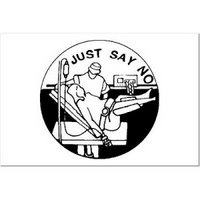Due Dates: Not an Effective Means of Date Control
I'll be posting some more substantial entries just as soon as I can get some time. In the meanwhile, I am now accepting april babies again!
Welcome to Birthyourway's Blog. This space is intended to serve as an interactive site for Doula related stuff based in Ottawa and around the globe. The archive links on the right hand margin will help you identify topics of interest to you. Your pictures of real pregnant bodies- stretch marks and all- would be most appreciated as contributions. Share your birth stories, concerns and comments by submitting to birthyourway@gmail.com
Hello! My name is Emily and I'm a fourth-year anthropology student working on my honours paper. I'm interested in looking at changing perceptions of the female body and how those perceptions have influenced birth and delivery, most specifically looking at the links between the concept of the female body as a cyborg or as a machine, and how that correlates to rising caesarean rates. I'm looking for more insights on this from people who work with birth. I'm looking for answers to the following sorts of questions:
Have you noticed a change in the type of woman (eg. age, class background, ethnicity, medical or health conditions, etc.) who delivers by caesarean since you began practicing? Please explain.
What do you see as being the reasons for a rise or decline or no change in caesarean births?
What do you see as the benefits/drawbacks to caesarean birth?
Do you think that the change in childbirth practices affects women on a socio-cultural level?
Do you think that the change in childbirth trends affects society at large?
Do you think that societal changes have affected childbirth practices? How so?
Also, I'm interested in looking at power relations within the emerging childbirth model (of rising ceasarean births) and of resistance to this model. Any feedback would be great!
Thank you.


Birth art is one of the mediums I use to explore birth and it's possibilities. On occasion, women are not interested in drawing pictures of themselves because they consider it childish or because they feel they can better express themselves in words. The majority of women though are curious and excited about birth art. The reason I like to use birth art (in the form of drawing, clay, dance and acting for example) is that it has been very helpful in discovering the more intuitive, mind/body birthing strength in each woman and partner.
In the first drawing above, I asked the woman to draw her fears. She said she had none and didn't know what to draw. I suggested that she draw a self-portrait while keeping in mind the word fear. The large heart represents her and the little one represents her unborn daughter. They are both happy and connected. Green is the colour she feels strongest about it also represents assertiveness. Both mother and child are in the same colour, sharing a connection that they are in this together. The green lines around the mother and child represent the mother's radiating strength of body and mind. It is unbroken and surrounds her. The blue swirls around the outside of the drawing represent infinite protection of the birthing mothers strength. I asked this mother if her fear was that something would come and break this infinite protection of strength. She said no, because it is infinite and unbreakable.
The second illustration is a drawing of the mother in the birth environment during labour/delivery. I asked her to make a self-portrait of the birth room. She said it was similar to the first drawing in that it was about her and her daughter surrounded by an infinite amount of strength and protection. She said there was no one else in the room, no material objects or presence other than of her and her child. This is because no matter what happened, if she was on a bed or the floor, if there were doctors she didn't like, they were irrelevant to her. She felt that she had sufficient support from her connection to her child, and the strength of her mind to get her through her birth. This was her experience and no one could touch it.
During her labour in the delivery room, she squatted on the bed (it was in an L shape and she hugged the upper part of it) and her self-portrait was tapped to the wall in front of her. It helped her to remember the mental strength she knew she had and helped her have the strength to believe in the infinite protection.
This woman had incredible power in her birth experience. Her birth art helped her express her birth vision and supported her through her delivery. It also helped me (her doula) be aware of where her strength came from so that I could help her use it as a focal point to get through the pain and discomfort of labour. Her birth art was a source of power in keeping her on top of the pain. She had a natural labour with no interventions (not even an IV, no drugs).
Every time an intervention was recommended, I was able to remind her of her strength and she was able to avoid the intervention, rather than become discouraged and disempowered. The birth art made us both aware and served as a reminder to be aware of her infinite strength and protection.

 Another day, another year at war. Another day, a new prime minister, happy at war. 3 years at war. Morning sunshine.
Another day, another year at war. Another day, a new prime minister, happy at war. 3 years at war. Morning sunshine.
As the 2nd wave feminist slogan goes "the personal is political". Yes yes. I get that. It just happened to smack me in the face today that’s all. I have an important announcement to make and though I consider this blog to be my professional blog and try to reserve my rants for other venues, this one is important to us all. I contacted one of the hospitals in town today to ask them a question regarding their policy regarding doulas. My question was as follows: "What is your policy regarding the number of people who can attend a birth including a doula?" The answer was two. So for a woman who desperately wants her mother, her partner and a doula attending and supporting her in labour, she must pick just two. I questioned her very carefully and politely about how doulas are not part of the family but are there as a health professional. Her answer? "Well the Doctors don't like it. It's too many guests." I politely said "Oh, okay thank you" and hung up.
Now, I understand that I don't work for the hospital so policy wise, I might be considered a guest. What I am concerned with is the nonchalant "the doctors don't like it". Let me just remind my reader that doctors normally are in the delivery room only after the mother has started pushing and the head is soon to be crowning. Doctors typically are in a birth for a relatively short period of time, sometimes only 20 minutes. An average first time birth is 16 hours. 20 minutes...16hours....
A labouring woman will not always have a nurse in the room with her. Nurses sometimes are fabulous and will massage you, breath with you but usually if this happens it’s only for a brief moment.
Whatever the situation, for a nurse to say, "Well the Doctors don't like it. It's too many guests" is a clear indication that birth in a hospital setting is not about the mother. Maternity wards are not mother centered health units. The important factor is what the doctors like, even when they are not there to enjoy it.
Birth is an immensely powerful life transition. You become a mother. There are incredible amounts of hormonal, emotional, and spiritual factors in every birth. It's intensely beautiful, miraculous, challenging and personal. Birth has the power to shape whom you psychologically experience yourself as. If you have a powerful birth experience, you can take that and negotiate whatever life throws your way with equal strength, courage and esteem.
When birth becomes someone else’s (dr.) experience, and when it's up to what the doctors like, you run the risk of being passive in your most personal, intimate moments.
This is not about how many people can be in your labour and delivery room. No, this is about who gives birth. Is it you, or the Dr.? I ask this question to all birthing women as a collective identity- however problematic that may be- because this is a gender based, systematic problem.
Unfortunately, the role of obstetrics has never been to help women give birth. There is a big difference between the medical discipline we call "obstetrics" and something completely different, the art of midwifery. If we want to find safe alternatives to obstetrics, we must rediscover midwifery. To rediscover midwifery is the same as giving back childbirth to women. And imagine the future if surgical teams were at the service of the midwives and the women instead of controlling them.
Michel Odent, MD
During birth, a woman naturally interacts with the environment in a rhythmic way. Partly, this is because of the pattern of contractions. They come and go. Between contractions, a woman can come back to what is happening in the room, talk, drink, walk. During contractions she focuses on her breath, she repeats low guttural sounds, she leans into someone. The pattern of her ritual emerges in her birth. The environment she is in shapes her rituals. Many of these factors are subconscious though it is possible to prepare a positive environment to enhance the birth rituals that emerge.
How do you see your birth unfolding? Think of the rituals you can predict. What activities will take place? What will make it happen that way? How does it make you feel?
Consider what our culture and what your subculture has determined birth culture is. What rituals are prevalent in our culture? How will this support your emotional being and your self-esteem? How will you prepare for a positive birth experience?
So I ask you some difficult questions. But I think it is worth it to evaluate how your personal platform intersects with what is expected of birthing women. How will this affect you on a psychological, emotional, spiritual level? How does western birth-culture and its rituals reinforce what women are considered to be in our society?
Visit this link for an evaluation of birth rituals in western culture.
[Ed. note - This is from a sheet of Frequently Asked Questions provided by a midwife who also offers labor support as a private-duty midwife. Some of the details may not apply to doulas who work strictly in accordance with DONA guidelines.]
[Other people are completely welcome to borrow the text from this page and tailor it to their own needs. Best wishes getting decent compensation for this vital work helping birthing families!]
Answer: The economics of professional labor support work are a mystery to many people; I offer this information so that you'll have a better idea of what you're paying for:
Hours - Couples having a first baby may imagine that I'll only be spending a few hours with them during the labor and birth. In reality, an eight-hour labor would be considered pretty zippy; most first labors last longer than 16 hours; the longest continuous time I've spent providing labor support is 38 hours. Average time spent with a woman for her labor and birth is about 16 hours. I spend another 10 hours in prenatal and postpartum meetings, and another hour or two in phone calls. My fee translates to an hourly rate of about $35/hour, before expenses and self-employment taxes.
Clients per Week - When I make a commitment to be available to attend you in labor, I have to limit the number of clients I put on my calendar so as to avoid birth conflicts and to ensure that I am reasonably rested when you go into labor. The rule of thumb for birth professionals providing in-home services is that one client per week is a full schedule. Since most of my clients are first-time mothers, I find that three clients per month is a full-time workload.
Clients per Year - When I put your due date on my calendar, I commit to being available two weeks beforehand and two weeks after that date. This means that when I schedule a two-week vacation, I have to add another four weeks during which I cannot accept clients. A full calendar is 32 clients per year; in reality, there are some weeks where I have to turn clients away and then there are other weeks where I have no births on the calendar.
Consultant Factor - The rule of thumb is that a self-employed professional's income is only half of what they earn, after deductions for vacation and sick time, self-employment taxes, health insurance, and business expenses. As you may imagine, my communication expenses are high - business phone, pager, cell phone and computer connection; I also have routine professional and office expenses and unusual transportation and supplies expenses. In addition, I bring several thousand dollars worth of equipment to your birth as part of providing midwifery care.
Putting It All Together - The annual income of someone providing labor support services with a responsible client load and a strong commitment to being available for your birth is 1/2 the number of clients per year times their fee per client. This is about 16 times the fee per client, and, yes, that's before taxes, including extra self-employment taxes. Although I am dedicated to this work, being on-call all the time requires a very high level of personal sacrifice, including a willingness to be beeped awake after half an hour of sleep to go attend a labor for the next 40 hours. About 25% of my clients have some kind of early labor which starts and stops, resulting in two trips to their home and being beeped awake twice. This past year, I spent most of my birthday at a labor, I spent Thanksgiving Day in a hospital, and I was beeped away from a big family gathering. I cannot take weekend trips away from the area, and even day trips to Santa Cruz or San Francisco have to be planned around traffic conditions. I never know what I'm going to encounter at a particular labor - I may end up wearing out my body supporting the woman in different birth positions; I may end up holding a vomit bowl for someone vomiting with every contraction during transition; I may end up with blood, meconium or worse on my clothes. Given all this, I'm sure you can understand why I bristled when someone once asked me why I charge "so much".
Bottom Line - Nobody's getting rich doing labor support work. I wish I could offer my services at a rate than everyone can afford, but that would require that I make even greater financial sacrifices than I am already making to do this work. I am a self-supporting professional, and my options are to earn a living wage working with birth or pursue more conventional employment, which would pay much more. There are people offering doula services at significantly reduced prices. They are either offering significantly reduced services, are still in training, or are basically offering charity. If you need charity, I encourage you to get labor support however you can; otherwise, you are doing future birthing women a disservice by making labor support an underpaid profession that cannot attract or keep talented, skilled individuals. If you end up selecting a doula who is undercharging for her services, I strongly encourage you to pay her more than she is asking; otherwise, she may not be around to help you with your next child.
Advocacy Suggestions - My services are covered by many health insurance plans because I'm a licensed provider; however, most non-midwife doula services are not. You can talk with your Human Resources representatives to ask them to lobby to include all doula services as a covered option in your plan. Additionally, you could talk with your midwife or doctor to encourage them to offer universal doula care to their clients. By hiring several doulas to be on-call for their clients, they could substantially reduce the cost per birth, although the doula might be someone you've never met before. You could also advocate for the hospital to provide universal doula care, so that it would be covered in the same way as their in-house lactation consultants are covered.
(text taken from http://www.gentlebirth.org)
INTRODUCTION TO HOMEOPATHY
This workshop gives comprehensive and practical guidelines to improving family health using homeopathy. Clinical evidence collected over 150 years of use proves the viability and efficacy of homeopathic medicine and the course points out how well it can work alongside standard medical practice.
Included in the course are the principles and philosophy of homeopathy, and main remedies for many acute ailments.
Saturday April 1st & 8th
9:00-1:00 p.m.
@ The Canadian School of Natural Nutrition
1510 Merivale Rd. Suite #4
Please call the school at 523-2766 to register
Cost: $150.00 + GST (+ textbook)
Instructor: Delia Pettit, HD, DSHomMed
This workshop is I.O.N.C. approved and counts for upgrading hours

Working in the birthing community, I've come to realize that there are too many things that happen behind closed doors. Sure, birth is very personal, but we could all use a little more truth in our daily lives, like how we come into the world for example, and how we die for that matter. These are the only sure things in life we are all born, and we all die. So why is it that we know so little about either? Here are some untold truths. Please feel free to add yours.
We have a secret in our culture, and it's not that birth is painful. It's that women are strong.
Laura Stavoe Harm

Every Doula works differently and offers different types of services. You might find it challenging to find a doula that suits your needs if you have very set ideas. Your best bet is to start looking early. Most doulas offer a free consultation either over the phone, email or in person. It is a good idea to interview more than one doula. This will give you an idea of what is out there in terms of philosophy, personality and experience. I recommend that you start looking at around 5-7 months gestation. This will give you plenty of time to find a doula in your area and give you time to do prenatal workshops with her if she offers them. It also gives you plenty of time to build a rapport and establish a trusting relationship.
That said, some doulas will accept to work with last minute clients. Some doulas will accept to attend only the birth while other doulas require that you take prenatal education with them in order for them to really get a sense of what will help you in your labour.
It is important to consider the schedule of a doula. Typically, a very busy doula attends a maximum of 4-5 births per month. If you contact her at the last minute, she might not be able attend your birth if she is booked. If this is the case, ask her to recommend a backup that you might contact.
The power and intensity of your contractions cannot be stronger than you, because
it is you.
Unknown
The best benefit of having a Doula is that you will have someone by your side that is experienced in childbirth. As a doula, I can help you identify what stage of labour you are in; I can reassure you when things are normal and help you decide what to do if they are not. I stay with you continually from beginning to end and I am there with you, as my only concern. I am not preoccupied with other patients; in fact I don't regard you as a patient. I will not leave your side to go on lunch break, talk to my coworkers about who's working what shift and how badly the management sucks, I won't leave to go home because my shift is over, I won't enter into your birth environment 12 hours into your birth and tell you what has been happening and where you are at as if you didn’t know! I will stay with you for you by your side, along for the ride.
In a home birth, you won't have a nurse. Your Midwife will arrive usually later into the labour when things are well on their way. This means it is up to you and your partner to manage everything in your home--getting water to drink, massaging, filling the tub, getting towels, getting the kids or dog to the neighbour, packing a bag in case of emergency, getting the blankets and buckets ready, and lets face it, as darling as your partner is, you can't expect them to be able to hold your hand and keep you focused while running to get a puke bucket, turning the tap off in the bathroom and keeping their calm and collected self together for you.
In either the home or the hospital, it is important to have at least one person who is there especially for you and your partner. It just helps keep everything together. It can take a lot of stress off of the mother because she knows she is not alone, she is comforted by having the presence of another woman (who is experienced) and she can forget about getting everything ready and therefore focus only on her body and her spiritual-emotional transition into motherhood. Likewise, the partner can be more present for the mother if there is an atmosphere of calm and there is someone there just to support them.
So why can't this person be a family member? Well it can be. But choose this person wisely. Will this person really be able to support you and your wishes? If this is your sister, mother or best friend, chances are they will have a difficult time seeing you in pain. Partly because its painful for them, but also because it catches them off guard. They are used to seeing you in certain ways, which may inhibit you, but also might frighten them. Also, if something really challenging comes up, they might not be able to think rationally and support you because they are in shock from the what if?
Having someone slightly removed from you, like a hired doula, you can expect a level of professionalism because this is their profession. You don't have to worry about their needs as much because they know what to expect and a good doula will be prepared and able to take care of their own needs in a discrete way. Unlike family members, Doula's anticipate being called at 2 in the morning after only an hour of sleep. And, they look forward to being with you and supporting you regardless of the sleepless, messy and emotional reality of birth.
These statistics are often reported to women thinking about using a doula. But how exactly is it that they work?
Benefits of having a trained doula:
50% reduction in caesarean births
25% shorter labour
60% reduction in epidural requests
40% reduction in oxytocin use
30% reduction in analgesic use
40% reduction in forceps delivery


Just as a woman's heart knows how and when to pump, her lungs to inhale, and her hand to pull back from fire, so she knows when and how to give birth.
Like most doulas, I claim to believe that birth is a natural process. But, always seeking the truth in things, I question even myself. Do I truly believe that birth is a natural process? How can it be a natural process when our society has transformed this intrinsic rite of passage into a medicalized sleeping-life event? Well think of it this way. Our bodies are biologically made of the same elements and constructed in homologous ways to other mammals. And those lovely creatures never use epidural! Women are naturally designed to give birth. It is a primal thing. Like a beating heart or like menstruation. There is a unique process to birth. In our society, we have accepted that it is up to the experts to control a pregnancy and a delivery. We have learned to trust them, and their invasive interventions. Funny that. We routinely intervene with a process that happens at every moment in nature, by itself. Like a seed for example. A watermelon seed falls from the mouth of a child and hits the ground in early spring. It is equipped with everything it needs to become a watermelon. And where nature allows it will grow. All we have to do is watch. In that seed, elements are arranged so that it may develop and grow all by itself. A baby born is much the same. There is a process, and when we watch closely without intervention, we can see nature unfold. We can witness how the body takes over and does what it intrinsically knows to do. But we have lost our way. And we no longer believe. Intelligence is a wonderful thing. Only sometimes, when we allow our minds to control our bodies and our actions, we miss the natural processes in our bodies and in our hearts. Like falling in love. I know some fantastic men and women whom for some reason have decided long ago that their mind will choose who they fall in love with. And to this day, they remain alone. They have rejected their intuition and have not allowed their bodies and hearts to feel seduction and to feel love. They wait for the mind to determine who is a good social fit for the. Perhaps I am romantic, but I believe that the body knows how to deliver a baby and when we can set aside our fears and our doubts, we can begin to listen to the intrinsic, primal process of our bodies and our hearts.
However, this is not to say that interventions are not necessary at times. I firmly believe that there is a place for medicine in childbirth. When complications arise, I count my blessings that our society has highly trained, intelligent minds and skilled individuals in our healthcare system. Also, though I believe that the female body is designed to birth 'naturally' I also understand the historical and social context that has shaped women and the men who support them ( though not all pregnant ladies have male partners or partners at all for that matter). It is important to acknowledge the identity platform from which we all individually negotiate. Each woman has her own unique situation, her own baggage, her own mental belief structure and support system to shape the way she individually feels about birth, and becoming a mother. There are so many social factors that lead women to feel think and act a certain way. In some cases, a woman has a strong desire to birth naturally, at home, unmediated and sometimes unassisted. In other cases women want a scheduled C-section.
Women differ. Therefore it is important to address every pregnant woman as a unique individual about to experience a highly personal life event.
So what is my philosophy on Birth? I wholeheartedly believe that homebirths are safe, that unmedicated births are natural and very realistic and most importantly, I think that as a care provider, I must meet birthing women at their own unique identity platform and support them the way they individually need to be supported.
Sometimes women choose to have a homebirth, and as things progress, the baby gets 'stuck' with no apparent physical or otherwise clinical reason. A transfer to the hospital and baby is born before the bed is ever reached. When asked why and what happened, mothers in these types of births tend to say "I just couldn't let the baby out at home". This is a clear indication that these women needed to be at a hospital because that is where their minds where set on having the baby. I always feel better knowing that the mother is at her chosen birth place since everything seems to progress much better when the mothers comfort levels are respected. Similarly, when a partner decides for the mother that she should birth in a hospital, despite her preference to birth at home, outcomes often reflect her denied preference. Either way, it is important for the mother to choose for herself (where possible according to the law) so that she may have positive and empowering birth experience.
I believe in putting birth back into the hands of birthing women. I want to facilitate empowering moments in women's lives through supporting their labour and delivery. So that they may take that positive experience into their lives and have the strength to negotiate what is ahead.
For further reading on a home birth safety study please read Home birth study.
As an introduction, I am currently working as a doula, I also volunteer as a "Birth Companion" to young women who are considered 'high risk'. I have worked with approximately 15 women as their Doula since September. I am currently on call and waiting for 3 babies in April. In the meantime, I am studying biology, continuously researching birth related subjects, promoting the use of doulas in childbirth, discovering HTML language and the blog world, enjoying my puppy Teaka, and waiting for news from Laurentian University's midwifery program-volet sage-femme. I work with a wonderful backup and we are preparing a workshop in May as it is international doula month. I am currently accepting clients from May onward